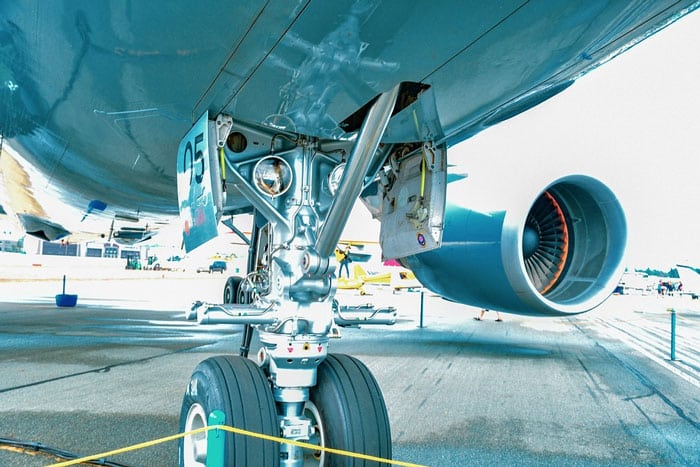
This post presents in-depth information on the aircraft mechanic career, including how to get into it, various opportunities available, and the benefits of being an aircraft mechanic.
How to Become an Aircraft Mechanic
The following are the steps you can take to become an aircraft mechanic:
- Confirm your Eligibility
To become an aircraft mechanic, you must be at least 18 years old and be able to read, write, speak, and understand English fluently.
You must also be able to pass the necessary tests within the next 24 months.
Finally, you must meet all knowledge, skill, and experience requirements for at least one of the two ratings: Airframe (A) or Powerplant (P) or both (A&P) Airframe and Powerplant.
2. Determine your Specialty
A variety of aircraft mechanics specialize in various aspects of the complex aviation repair sector. These include:
- Aircraft Mechanics
Typically, entry-level service technician positions are overseen by a supervisor.
Routine repairs and inspections must be performed while learning from experienced mechanics.
After accumulating expertise, mechanics may advance to the position of supervisor and eventually maintenance director.
Certified mechanics that often supervise personnel and handle maintenance operations are known as airframe and powerplant (A&P) mechanics.
- Avionics Technicians
These are experts in navigation equipment, radios, autopilot systems, entertainment systems, and aircraft cables.
- Inspection Authorized (IA) Mechanics
Typically, maintenance directors conduct the FAA-mandated annual inspections of aircraft.
- Aviation Investigator
The National Transportation Safety Board (NTSB) employs aviation inspectors to investigate the scene of an aviation incident in order to establish the cause and effects.
3. Determine your Educational Pathway
A college degree is not required to become an aircraft mechanic, however most training programs include at least 18 months of technical instruction at an FAA-approved aircraft maintenance technician school (AMTS) (FAA).
An aircraft mechanic program requires course work to master systems, hands-on training, and passing tests.
There are Bachelor’s and Associate’s degree programs available, which can help enhance work opportunities and earnings potential.
The vast majority of aircraft mechanics and aviation technicians hold an Associate degree.
More on How to Become an Aircraft Mechanic
4. Gain Experience
Some aircraft mechanics have a high school diploma or GED and receive experience through apprenticeships and on-the-job training.
There are entry-level aviation mechanic positions available that require no prior expertise.
This gives you the opportunity to do routine maintenance, inspect systems, and acquire experience while learning from professional aviation mechanics.
Communication, attention to detail, and the ability to follow specific, extensive, and complex instructions are all necessary qualities for entry-level positions.
Employers looking for entry-level aircraft mechanics will most likely require an Airframe and Powerplant (A&P) certificate and/or extra courses.
5. Obtain FAA Certification
To obtain FAA certification, you must be 18 years old, have outstanding oral and writing English communication skills, and have either attended an FAA certified AMTS or 30 months of airframe and powerplant experience.
To complete your A&P Certification, you must also pass the required written, oral, and practical exams within 24 months.
Aircraft Mechanic Career Opportunities
Here are career opportunities open to an aircraft mechanic:
- Lead Mechanic
A lead mechanic is a mechanic with substantial experience who takes on key roles, such as a supervisor, manager or team leader over others.
He/she will be responsible for multiple tasks and projects at once.
The responsibilities will be to lead a team of mechanics who are working on specific aircraft or line maintenance tasks.
2. Crew Chief
A crew chief is a mechanic who has achieved seniority and experience managing a crew level maintenance activity.
They help with the set-up of the maintenance activity, such as equipment preparation, planning of the crew’s day, and coordination of actions and decisions amongst the mechanics and other crew members.
It is also a common role for them to manage basic requirements such as locker assignment, meals, and social facilitation.
3. Maintenance Manager
A maintenance manager is responsible for overseeing maintenance activities for an entire group or department of mechanics (such as squadrons or facilities).
The maintenance manager may also be responsible for scheduling staff schedules and supervising individual mechanics.
They’ll usually be required to perform some maintenance tasks themselves, such as repair of engines or other parts through maintenance actions.
4. Maintenance Director
A maintenance director is responsible for a facility’s day to day activities and operations. They are also responsible for coordinating different parts of the facility’s maintenance schedule.
Maintenance directors are often responsible for the day-to-day operations of the maintenance facility or department.
Their role includes preparing schedules for the facility’s mechanics.
More Aircraft Mechanic Career Opportunities
5. Maintenance Superintendent
Maintenance superintendents take on organizational and strategic tasks on a higher level than the usual maintenance manager.
They may be responsible for developing new technologies in order to increase efficiency and safety in maintenance practices they oversee.
Maintenance superintendents are usually required to perform some tasks themselves, such as repairing engines through maintenance actions.
6. Sheet Metal Mechanic
It is the duty of a sheet metal mechanic to make, repair, and install ductwork and metal roofs.
They will often work on the planning aspects of a new building, advising the project manager on how to construct buildings cheaply.
7. Foreman
A foreman will be responsible for managing several mechanics or technicians, such as aircraft mechanics, as well as overseeing their work.
They are also often responsible for ordering parts and materials that are needed to do their job. A foreman will often be the one who sets up work stations and sets out work schedules.
8. Maintenance Supervisor
A maintenance supervisor is a mechanic that has years of experience in the maintenance field and has been promoted to maintain the responsibilities of many people, such as mechanical equipment, aircraft, or software programs.
They are responsible for tasks such as supervising multiple employees’ work and scheduling maintenance projects.
Additional Aircraft Mechanic Career Opportunities
9. Electrical Foreman
An electrical foreman is a mechanic that oversees the work of others. They are responsible for performing tasks in facilities, buildings, or jobsites that involve electrical equipment and machinery.
They often work on projects involving the construction of buildings or new machinery.
10. Electrical Supervisor
An electrical supervisor is a mechanic that oversees the work of others. They are responsible for performing tasks in facilities, buildings, or jobsites that involve electrical equipment and machinery.
They often work on projects involving the construction of buildings or new machinery.
Challenges faced by Aircraft Mechanic on the Job
Here are challenges an aircraft mechanic could face in their job:
- Stress
Job stress comes from the demands of individual jobs, like an aircraft mechanic. In order to manage this, they must be aware of the sources of stress and develop coping strategies, such as setting aside time for completing tasks.
Another important coping strategy is to remember that job stress is not uncommon and many people go through it.
Also, seeking advice or help from supervisors or other people within their company is a good way to improve their situation.
2. Component management
Aircraft mechanic will often have responsibility for components that need to be maintained or replaced, such as engines and other parts.
They will have to manage these components to ensure they are in good working order, which is both important and time consuming.
This is also a critical aspect of their job, which can cause them stress; however, it is often essential for the smooth running of the aircraft.
3. Managing people
Aircraft mechanic must learn to work with others well; therefore, they must be able to be attentive to others and keep track of them.
These activities are necessary for a smooth running of the organization, which is vital for the aircraft mechanics. They will be responsible for some maintenance tasks and may need to do some other duties, depending on the job.
Major Benefits of Aircraft Mechanic Career
Here are major benefits accessible to aircraft mechanics:
- Great job outlook
Aircraft mechanics have a very good job outlook, mostly because of their helpful and critical work.
Many aircraft mechanics work for airlines, airfreight companies, or other large organizations.
Aircraft mechanics are also in demand for developing and repairing different planes manufactured by Boeing, Airbus, and other large organizations.
2. Good salary
Aircraft mechanics make a good salary. You can find a job working as an aircraft mechanic in many industries, such as:
- Aerospace
- National defense
- Utility services companies
- Transportation and storage companies
- State, federal and local government agencies.
3. You make a difference in people’s lives
The work that you do as an aircraft mechanic will most likely be in an environment where you can make a difference in people’s lives.
You need to be able to get along well with others because you are constantly working with your team and other teams.
4. Working with your hands
Working as an aircraft mechanic is a more hands on job. It involves working with tools and machinery to complete repairs and regular maintenance.
More Benefits of Aircraft Mechanic Career
5. Room for growth within the role
Aircraft mechanics are often promoted into management roles such as inspector, instructor, or manager.
As technology improves in the aviation industry so will the requirements of a person performing maintenance on aircraft itself.
You have constant room for growth within the role because of new technology or new developments within the aircraft industry itself.
6. Steady opportunities for learning
As an aircraft mechanic, you will have many opportunities to learn how things work and how to fix them.
If a part of a plane breaks or malfunctions you, will need to know how the part works and what may have caused it.
You will also learn that parts can fail for a variety of reasons and it is important to know why each part is important for aircraft safety.
Conclusion
Aircraft mechanics are required to have good communication skills, a steady work ethic, and willingness to learn new things.
Many airlines would like to employ aircraft mechanics because of the important role they play in the safety of air travel and the importance of their work. This post has provided detailed information to boost your knowledge about the aircraft mechanic career.












